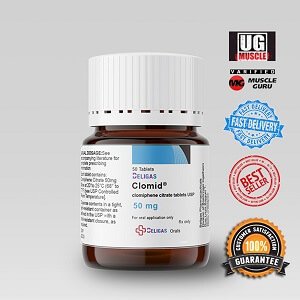Introduction to Clomid and Its History
Clomid, scientifically known as Clomiphene Citrate, stands as a pivotal pharmaceutical agent initially designed to address fertility issues in women. Its primary function revolves around stimulating ovulation in females struggling with infertility, operating by inducing the release of essential reproductive hormones. These include follicle-stimulating hormone (FSH) and luteinizing hormone (LH), which are critical in the ovulatory process.
However, over time, the therapeutic range of Clomid has expanded, garnering significant attention for its off-label use in men. This trend emerged as researchers discovered Clomid’s capacity to elevate testosterone levels, thereby addressing several male-related conditions such as hypogonadism—characterized by subnormal testosterone production—and male infertility concerns.
The biochemical mechanism behind Clomid’s effectiveness in men lies in its ability to block estrogen receptors in the brain. This inhibition leads to an increased secretion of gonadotropin-releasing hormone (GnRH), which subsequently stimulates the pituitary gland to release more FSH and LH. Elevated levels of these hormones enhance the natural production of testosterone in the testes, contributing to improved fertility parameters and overall hormonal balance.
The origins of Clomid trace back to the late 1950s and early 1960s when it was first synthesized and studied. It received approval from the U.S. Food and Drug Administration (FDA) in 1967 for the treatment of female infertility. Since then, it has been widely prescribed and remains a cornerstone in reproductive medicine due to its established efficacy and safety profile.
In summary, while Clomid’s primary indication was for female infertility, its role has significantly evolved. Today, it represents an invaluable option for managing certain male hormonal deficiencies and infertility issues. This dual-purpose utility underscores its versatility and ongoing relevance in medical practice.
Medical Uses of Clomid for Men
Clomid, also known by its generic name clomiphene citrate, is a medication traditionally used to treat female infertility. However, in recent years, it has also been prescribed for certain medical conditions in men, most notably hypogonadism and infertility. This off-label application has shown promising results, making Clomid a critical tool in managing male reproductive health.
Hypogonadism is characterized by low levels of testosterone, which can lead to a range of symptoms including fatigue, decreased libido, and diminished muscle mass. Clomid works by stimulating the pituitary gland to release more luteinizing hormone (LH) and follicle-stimulating hormone (FSH). These hormones, in turn, prompt the testes to produce more testosterone, thereby alleviating the symptoms associated with low testosterone levels.
In addition to treating hypogonadism, Clomid has been effective in addressing male infertility. By increasing the levels of LH and FSH, Clomid improves both the count and quality of sperm. Numerous studies and clinical trials have demonstrated its efficacy in this area. For example, a study published in the “Journal of Urology” highlighted a significant improvement in sperm count and motility after Clomid treatment in men with unexplained infertility.
While Clomid is primarily used for these two conditions, it is also prescribed off-label for other purposes, such as treating certain cases of erectile dysfunction and low libido. However, it is essential that healthcare providers carefully evaluate individual cases to determine if Clomid is suitable. Factors such as the patient’s medical history, the underlying cause of symptoms, and potential interactions with other medications all play a role in this decision-making process.
In summary, Clomid offers a range of benefits for men dealing with hypogonadism and infertility by stimulating the production of essential reproductive hormones. Ongoing research continues to explore its potential for other off-label uses, further solidifying its place in the landscape of male reproductive health treatments.
Benefits and Efficacy of Clomid in Men
Clomid (clomiphene citrate) has emerged as a viable option for addressing certain male health conditions, particularly hypogonadism and infertility. Several studies have demonstrated its effectiveness in boosting testosterone levels in men with hypogonadism. For instance, a clinical trial reported that approximately 75% of participants experienced a significant increase in testosterone levels after 3 months of Clomid therapy. Such outcomes indicate that Clomid can be as effective as traditional hormone replacement therapy (HRT), with the added benefit of stimulating the body’s natural hormone production rather than relying on synthetic hormones.
In the realm of infertility, Clomid has shown promising results. Men with idiopathic infertility have reported improved sperm motility and count, essential factors for successful conception. A study involving 100 men with infertility issues revealed that around 40% of subjects experienced an increase in sperm concentration and motility after six months of Clomid treatment, leading to a notable number of successful pregnancies. This enhancement in reproductive parameters is crucial for couples struggling with infertility, offering hope and a potential non-invasive treatment route.
Personal testimonials further accentuate the real-world effectiveness of Clomid. One patient, John D., shared his journey of dealing with low testosterone levels and consistent fatigue. After undergoing Clomid therapy, he observed a marked improvement in his energy levels and overall well-being without the side effects commonly associated with traditional HRT such as injections or gels. Another individual, Mark S., attributed successful conception with his partner to Clomid, highlighting its role in improving his sperm quality over a few months of administration.
Comparatively, Clomid offers distinct advantages over other treatment options. Unlike HRT, which can be costly and involve regular maintenance, Clomid is relatively cost-effective and often requires less frequent medical supervision. It stimulates endogenous hormone production, reducing the likelihood of dependency and diminishing the risk of long-term side effects often seen with external hormone supplementation. By providing an accessible and effective treatment option, Clomid has solidified its place as a potent tool in addressing male health issues.
Potential Side Effects and Risks of Clomid for Men
While Clomid has shown efficacy in treating certain conditions in men, it is important to be aware of the potential side effects and risks associated with its use. Common side effects reported include headaches, vision changes, and gastrointestinal issues such as nausea and abdominal discomfort. These symptoms are typically mild and may resolve on their own with continued use or after discontinuation of the medication.
However, Clomid usage does carry the risk of more severe side effects. One significant concern is the potential for blood clots, which can lead to serious complications like deep vein thrombosis or pulmonary embolism. Additionally, there is a risk of liver dysfunction, which necessitates regular monitoring of liver function tests while on Clomid therapy. Men may also experience alterations in mood, including anxiety and depression, which can impact overall mental health.
Medical supervision is crucial when using Clomid. Healthcare providers often recommend regular follow-ups to monitor the patient’s response to the medication, side effects, and any potential complications. If severe side effects are experienced, such as sudden vision loss, severe headaches, or signs of a blood clot (e.g., swelling, pain, and warmth in one leg), it is imperative to seek immediate medical attention. Early intervention can mitigate the risk of long-term damage or more severe health outcomes.
Prolonged use of Clomid also warrants caution. Chronic administration may pose additional risks, including potential negative effects on testicular function and hormonal balance. Patients taking Clomid for extended periods should undergo continuous evaluation to ensure that benefits outweigh the risks.
In summary, while Clomid can be beneficial for treating certain conditions in men, it is not without risks. Proper medical supervision, regular monitoring, and prompt response to any adverse effects are essential to ensure safe and effective use of this medication.





Alethea –
Quality products and fast shipping. Great customer service and if there is a problem they will solve the problem quickly. Love the products and you get the real deal.
JoshuaJonathan D. Allen –
I definitely give the a 10 outta 10. Quality Service and time of of shipment was on point.